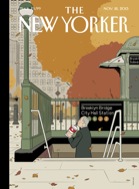 SOUNDTRACK: CÉCILE McLORIN SALVANT-Tiny Desk Concert #790 (September 25, 2018).
SOUNDTRACK: CÉCILE McLORIN SALVANT-Tiny Desk Concert #790 (September 25, 2018).
 The blurb talks about Cécile McLorin Salvant’s punk roots. This made me thing that their might be some rough elements in these songs.
The blurb talks about Cécile McLorin Salvant’s punk roots. This made me thing that their might be some rough elements in these songs.
But these songs sound akin to old-fashioned-sounding jazz standards (even if she wrote them recently) in the vein of Ella Fitzgerald or Sarah Vaughn.
The nod to punk seems to come in the vaguely erratic piano which verges on atonality at times. And yet:
From listening to McLorin Salvant’s exquisite performance here, I also couldn’t tell that when she was 15, she was listening to Alice in Chains, sported a Mohawk and was into what she calls “radical feminist punk stuff,” as she told NPR after the performance. “Sometimes I still really like Bikini Kill, and I still have my little Pearl Jam grunge moments.”
What can be heard in each song is a seasoned jazz singer with a vast vocal range, meticulous technical execution and a superb classical vocal foundation, which actually began when she was just 8. Her background in classical piano is evident in the inventive harmonic and melodic construction of the first three songs heard here; all are romantically themed McLorin Salvant compositions from her third album, For One to Love, recorded in 2015. The record won her a 2016 Grammy for Best Jazz Vocal Album.
“Fog” opens with some striking minimalist almost atonal piano playing. The song veers through many different tones and styles throughout its five plus minutes.
About “Look At Me” she says, “This was originally called “‘Friend Zone’ which is a zone I know so well.” The piano is delicate–twinkling–as she sings about being the friend when she wants more.
She says the next song is called “Monday,” “Lets see if I remember the lyrics.” After introducing Foster, he comments, “I just learned this on the train here, so bear with me.” This is notable because there is a lengthy, lovely piano instrumental part in the middle.
After a hog, Foster leaves and McLorin Salvant prepares for the last song.
McLorin Salvant closes with “Omie Wise,” an American folk song that tells the tragic story of murder victim Naomi Wise and her husband and killer, John Lewis:
Then pushed her in deep waters where he knew that she would drown
He jumped on his pony and away he did ride
The screams of little Omie went down by his side.
Feminist themes are common in McLorin Salvant’s music, and while “Omie Wise” addresses gender-based violence, she says she sings difficult songs like this to address an important historical legacy. “We don’t sing to our kids and we don’t know any of our folk music anymore,” McLorin Salvant says. “But like all of the history of race songs, coon songs, minstrel music, music from Vaudeville, all of that is like, ‘No, we’re not going to address that — that’s too ugly.'”
This song is especially powerful sung a capella and even more so when it is heard on the weekend that that piece of excrement Kavanaugh is having his Supreme Court hearings.
[READ: January 19, 2018] “Admiral”
T. Coraghessan Boyle is an incredibly prolific writer. He writes about a huge variety of topics as well. Some of his stories are down to earth and realistic while others, like this one, are based in a near-future fantasy.
The premise of this story is simple and not all that far-fetched (especially in 2007). A rich couple has cloned their beloved dog, an afghan named Admiral, for $250,000. They want to raise this dog exactly as the first Admiral was raised. They believe in the cloning to create an identical dog, but they also believe in the nurture aspect which means they need the girl who dog-sat for him to do everything exactly as she did all those years ago.
That girl, now a woman, was recently laid off and needs some cash. So when Mrs Striker called and told her she had an opportunity, Nisha said… why not?
She returned to the house where she hadn’t been in four years but which was such a large part of her childhood. (more…)














